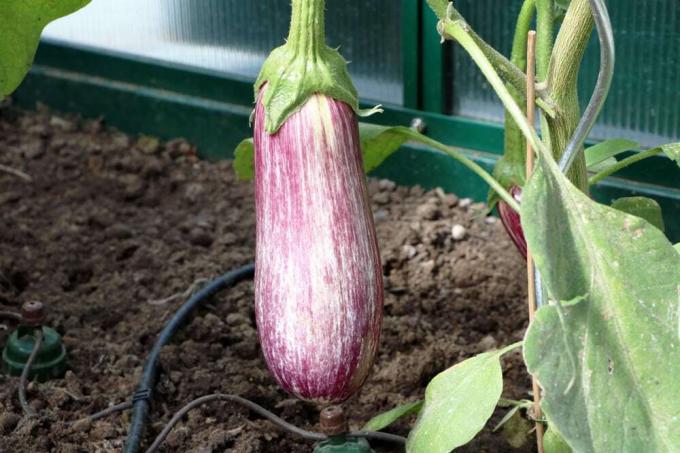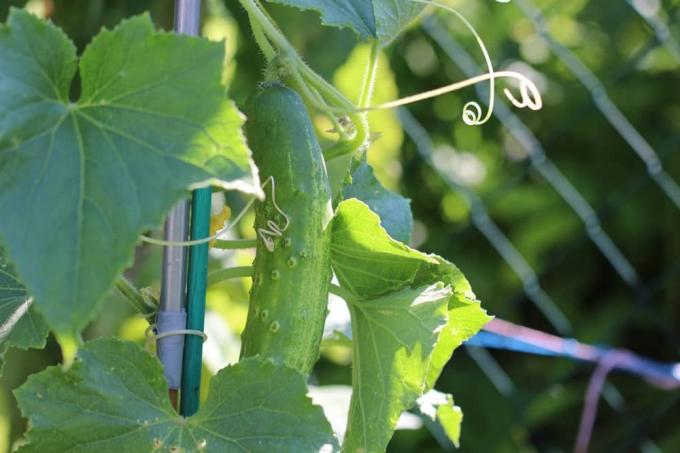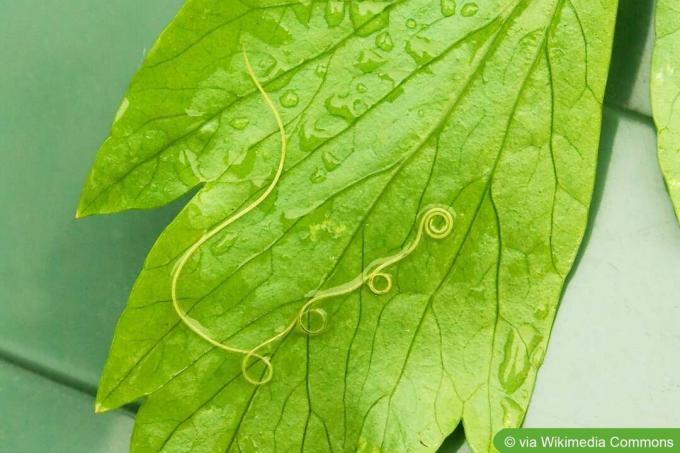

Table of contents
- Eggplant raw edible?
- ingredients
- Solanine intake and its consequences
- Toxicity to pets and livestock
- Poisoning symptoms in dogs and cats
- Symptoms in rabbits and guinea pigs
- Eating raw fruits during pregnancy
- Reduce the proportion of bitter substances
Eggplant is now available in different shapes and colors. In prepared form, they are very healthy. But what about raw fruits, are they edible or even poisonous?
Eggplant raw edible?
What is safe to say is that eggplant, which like potatoes and tomatoes belongs to the nightshade family, is only mildly to non-toxic. However, you can hardly eat them raw. This is due on the one hand to the bitter substances it contains, which make the fruit taste very bitter, and on the other hand to the slightly toxic alkaloid solanine.
- Contained only in small amounts in ripe fruits
- In small or normal amounts completely harmless
- Proportion in raw and unripe fruits significantly higher
- In principle, eggplants can also be eaten raw
- Only ripe fruits and modern breeds provided
- Leave unripe aubergines to ripen at room temperature
During the ripening process, this mildly toxic alkaloid gradually decomposes, although it is hardly present in modern breeds anyway. The situation is different with varieties from old seeds, where it can occur in higher concentrations. Incidentally, it cannot be removed or weakened by frying or grilling, only by cooking. A large part goes into the cooking water, which is then usually poured off.
Tip:
When ripe, the skin of the eggplant is smooth and shiny and can be indented. The flesh under the skin is relatively soft and white, green when unripe.
ingredients
- 92.6% water
- 2.8% fat-soluble fiber
- 0.5% minerals
- 0.2% fat
- 1.0% protein
- 4.0% carbohydrates
- B vitamins and folic acid
- The toxin solanine and bitter substances
Tip:
Sensitive people may have an allergic reaction to one or the other ingredient.
Solanine intake and its consequences
The alkaloid is a weak neurotoxin that can be found in the leaves, flowers and unripe fruits of this plant. The toxin is particularly high in unripe and raw fruits. Only the cooked fruits including the peel are suitable for consumption.
- Consuming raw fruits may result in health problems
- With larger quantities, symptoms of poisoning
- These include headaches, gastrointestinal problems and vomiting
- More serious consequences include drowsiness and difficult breathing
- Up to damage to the nervous system
Only when cooked do the fruits lose their poisonous effect. Although the bitter substances are harmless to health, they are largely responsible for the inedibility of raw fruits. Enjoyed in moderation, bitter substances can even have a positive effect on health. Modern breeds are usually less bitter and the solanine content is usually lower here.
Toxicity to pets and livestock

The fruit in particular has an increased toxic effect due to the high solanine content for pets and farm animals such as dogs, cats, guinea pigs and rabbits. Although dogs and cats in particular tend to be carnivores by nature, they can eat aubergines in their diet. When cooked and in very small quantities, this is usually not a problem. Fruit that is raw and/or unripe should never be fed. Rodents and even chickens should not be given either one or the other.
Poisoning symptoms in dogs and cats
- Vomit
- Gastrointestinal problems
- indigestion
- cramps
- Tremble
- weakness
- shortness of breath
- paralysis
- cardiac arrest
At the latest when the dog or cat suffers from shortness of breath or signs of paralysis, a veterinarian should be consulted immediately. As a first aid measure, you can administer charcoal tablets to your animal. They have the property of binding toxins and guiding them out of the body.
Symptoms in rabbits and guinea pigs
- More frequent drinking
- Increased salivation
- refusal of food intake
- diarrhea or constipation
- blood in the urine
- nosebleeds
- Fever
- muscle tremors
- pupillary changes
- shortness of breath
- seizures
- paralysis
- drowsiness and unconsciousness
Slow poisoning can manifest itself in skin changes, pale or bluish discoloration of the mucous membranes, weight loss and hair loss. Then you should take the animal in question to the vet as soon as possible.
Eating raw fruits during pregnancy
A healthy diet is particularly important during pregnancy. Aubergines (Solanum melongena) in particular are among the recommended foods at this time. But here, too, it is all about fully ripe and boiled or otherwise cooked fruits. Properly processed, they can also be eaten without hesitation by pregnant women, alternating with other types of vegetables. They should not be eaten in their raw state, especially now. On the other hand, the contained bitter substances are unproblematic. They have no negative effects on health, neither for the pregnant woman nor for the unborn child.
Reduce the proportion of bitter substances

In order to reduce the proportion of bitter substances before preparation, the ripe fruit can be cut into slices and sprinkled with salt. Then you leave them for about thirty minutes and wash them off thoroughly. Another benefit of salting is that the salt pulls the water out of the fruit, so it soaks up less fat when it's roasted or grilled. However, this is usually no longer necessary with modern breeds, which are nowhere near as bitter as those from old seeds.
 Home editorial office
Home editorial office
Learn more about processing garden vegetables

Freeze Eggplant | 4 storage tips
The club-shaped fruits of the aubergine, also known as eggplant, can be processed into numerous delicious dishes. Especially when fried, it reveals its pleasant, buttery-tender taste. However, it is not suitable for raw consumption and has a limited shelf life when fresh.

Fennel tea: 9 tips to make yourself
Fennel tea is said to have some positive effects on the respiratory and digestive tract, to have a calming effect and to be antispasmodic. It is very easy to make it yourself with our tips and the practical instructions from fresh fennel.

Pickling cucumbers: information on cultivation, harvesting and pickling recipes
Pickles are crunchy, fresh, salty, sour or flavored with mustard in a delicious preserve that's easy to grow and prepare at home. Of course, a few things have to be considered, because the plants are sensitive as easy as the culture is. Information for all steps from cultivation to preparation can be found here.

Chicken breeds from A-Z | 33 types of chickens with picture
There are many different breeds of chickens that not only differ in appearance and size, but also in egg color and egg production. In addition, chicken species have different characteristics. In this article, we will briefly introduce you to 33 well-known and popular chickens.

Hydrangea sheds leaves/flowers - you can do that
Hydrangeas delight us with their dense growth and showy flowers. It is all the more annoying when it sheds leaves and flowers and begins to bare. With the right knowledge, however, the hydrangea can often be saved without any problems and encouraged to grow lush again.

Nematodes - Knowledge of the beneficial roundworms
More and more allotment gardeners are using beneficial insects instead of chemical agents to combat harmful insects. Beneficial nematodes, a type of insect-parasitic roundworm, are among the biological means of controlling many insect pests. They do not pose any danger to humans, animals or plants and can be used without side effects.


